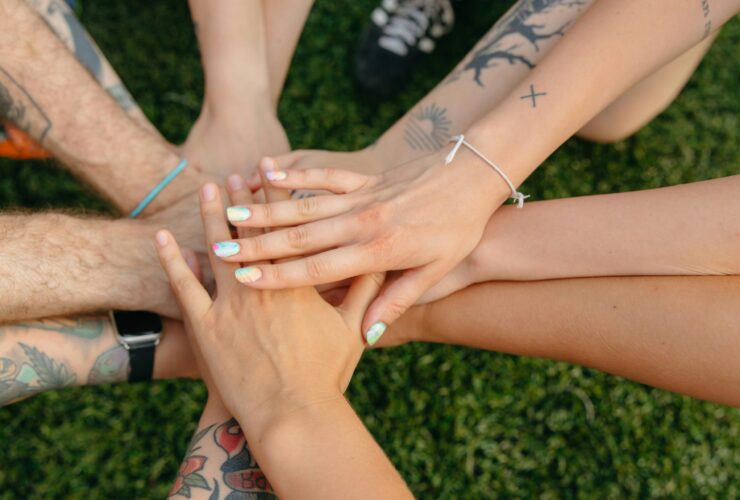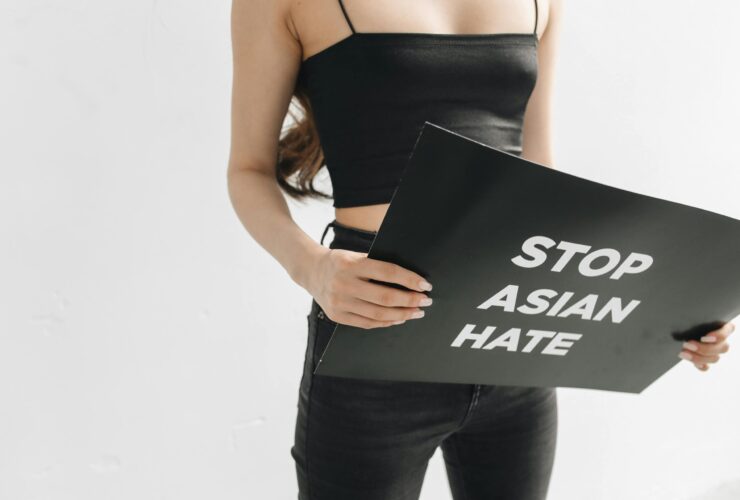Why is Destigmatizing Mental Health Important?
Destigmatizing mental health is essential. Asian therapist everywhere knows about the rising concern of Asian American mental health. This is because untrue information about mental health treatment can convince people to not get the help that they need. Stigmas can push Asian Americans away from 1) helpful resources that can help them or even their child, such as those with ADHD, 2) finding support for their overwhelming thoughts, 3) gaining skills on how to better manage their relationships, 4) learning new ways on handling stress and other feelings and so much more.
At Yellow Chair Collective we have culturally competent mental health Asian therapists that can help Asian and Asian Americans become more successful at reconnecting and balancing their cultural, ethnic, and familial backgrounds to achieve their goals.
Statistics on Asian Americans and Mental Health

Between 2000 and 2015, Asian Americans were the fastest-growing racial group in the United States. In 2019, 2.9 million Asian Americans and Pacific Islanders reported that their mental health was affecting their daily life. One could argue that the amount of people who are needing mental health treatment is increasing quickly.
Some estimate that Asian Americans are three times less likely to look for mental health treatment or general help. This is compared to other racial groups in the United States. Imagine all the other members of our Asian American community that has not reported their mental health struggles.
This may be shocking to hear, but according to data from the Centers for Disease Control and Prevention, suicide is the 10th leading cause of death in the United States. When broken down by race, suicide is the first leading cause of death among Asian American young adults. This includes those between the ages of 15 and 24. For all other racial groups in this age bracket, it does not affect them nearly as much. If this is so prevalent, why is it that there is still such a stigma around mental health?
Mental Health Impacts Everything
Community is essential in collectivistic cultural groups like Asian Americans. The family is the building block, the identity, and the extension of every Asian American. So much so that an individual’s actions, choices, thoughts, and emotions, can all reflect back to the family. Asian Americans are considered “acting out of line” or “selfish” if they do something outside of the family’s interest.
When a mental health illness enters the equation, it’s going to rock the boat one way or another. Examples of this may include but are not limited to when a suicide occurs but the family continues to keep the matter to themselves and experiences shame and guilt. This could lead the family to not engage with other community members or their families. This is due to the preservation of face, not wanting to “air their dirty laundry to others”. Or to prevent others from losing face because a matter like suicide can burden others.
Another example is when families experience conflict and disagreement on values. It can bring about stress, frustrations, and anger that builds resentment, rather than closeness. These are some of the ways that we’ve seen Asian Americans experience mental health problems within their family origin.
Barriers to Mental Health Treatment for Asian Americans
Cultural Values
There are Ancient Asian philosophical traditions that are strongly tied to someone’s self-value and their ability to care for their family and community. This is known as collectivism and social liability. Having a mental health illness can be seen as limiting one’s ability to fulfill these expectations. For example, some Asian families will not talk about their struggles because they believe that it will bring shame upon them. Or if discussed with others, that it will burden the other party.
Spiritual practices can also negatively influence the idea that mental health illness is a sin, an evil spirit, or even something that can be cured through religious rituals, such as prayers. This is why some groups of people will not seek out mental health practitioners, but rely on religious leaders.

Financial Reasons
Asian Americans are usually seen as successful and educated citizens, according to the Model Minority Myth. What others do not know is that there is a large income gap among all the different Asian ethnic groups. The financial cost has been one of the common barriers that our Asian American clients have experienced.
At Yellow Chair Collective, we take insurance such as Cigna and Etna. We also offer a sliding scale for our therapist fees. If available, we can get you connected with other programs that can help cover some of the cost of sessions.
Language Barriers
Because few Asian Americans seek out mental health treatment, those who do may find it hard to access treatment or find themselves in spaces that do not have many people of a similar race or ethnicity to whom they can relate to. This can also lead to language barriers, feelings of discomfort, not having resources translated into their language, implicit biases, and a lack of culturally appropriate therapists.
At Yellow Chair Collective, we specialize in Asian American mental health and provide therapy in the following languages: Mandarin, Korean, Japanese, Malay, Nepalese, Vietnamese, Hindi, and Cantonese.
Family Expectations

Having a mental illness or even admitting that one does can perpetuate shame. This reality and familial pressure can influence people to keep this to themselves. It’s been common to hear from Asian Americans who are now seeking mental health treatment share that their parents or grandparents suffered a greater amount, therefore their current struggles don’t amount to anything.
As an Asian therapist, I have seen how this has caused a delay in seeking out mental health therapy from others in the community. Another expectation that we’ve heard is that children of Asian American families need to be more grateful for their opportunities since their family has made such a large sacrifice. All of the above can make an Asian American client feel guilty and shameful that they are seeking out treatment and creating boundaries.
How Can We Collectively Destigmatize Mental Health?
Talk Openly About Mental Health
Find people you trust that will have the conversation with you without shame, guilt, and judgment. It might be scary, intimidating, and/or out of the norm to do so, but life is not meant to be approached by ourselves. People want to be there for us, especially our loved ones. Allowing others into our own lives, builds closeness, respect, humility, and a sense of community. If finding someone close to you isn’t an option you can always speak with an Asian therapist in New York.
Confront Preconceived Beliefs
In the Asian community, there is this belief that we cannot be a liability to others. The belief states that if we are to show our suffering to another person, we are then seen as a liability or one that causes others to lose face in the community. Therefore we must preserve “face” and not talk about deep issues or emotions.
Beliefs like this can make it difficult for one to seek out help for their mental health journey. Let’s try and reframe this belief together. If we are to lose someone to mental illness, that can harm our community. Since East Asian cultural groups are collectivistic, I believe that it’s more healing to confront these issues as a community so that we can all be aware and present to support each other even in the most difficult times.
Learning More About Mental Health and Teaching Others

Taking some time to learn about how mental health can affect your overall health can be important. When we experience tragedies or traumatic events, our symptoms and reactions are not out of the norm. There is important research that can account for these symptoms or reactions and help provide a solution. For example, when someone is thinking about committing suicide, it’s important for others to know how to talk to someone about their struggles.
Saying comments such as “You shouldn’t feel this way.”, “Why do you feel this way?”, or even “Things will get better.” are not necessarily the most helpful at that moment. But if we can learn to manage our own thoughts and emotions as the listener and use comments such as “Wow this must be really hard. When was the last time you felt this way?”, we can be helpful at least until that person can seek out treatment from a mental health professional.
Be Conscientious About Language
Fighting the stigma of mental health is important. This is why we want to address the importance of the language we use surrounding mental health. For example, “I struggle with depression” expresses the idea that I am a whole person despite a mental illness. Rather than encapsulating a person’s identity as depressed such as the example, “I am depressed”.
Another example relates to suicide. When we say “so and so committed suicide”, we want to reframe that wording into “so and so died by suicide” or “lost their life to suicide”. The simple wording of “commit” alone signifies that suicide is a moral/ethical/spiritual crime, which then reinforces the stigma that a person is selfish and/or had a personal choice in the matter.
Recognize That Physical and Mental Health are Equally Important
Mental health isn’t always initially visible, which can add to the stigma of mental health not being prevalent. As a matter of fact, mental health plays a large role in our physical health. Studies have shown that positive psychological health can reduce the risk of heart attacks and strokes. Chronic diseases such as cardiovascular disease can be reduced if mental health illness such as anxiety is managed and treated.
Choose Empowerment Over Shame
Instead of saying, “why are you going to therapy?” or “Isn’t therapy for crazy people?” We want to empower those who are seeking mental health treatment in their journey. Ask about what they are learning in therapy with their Asian therapist. Ask how you can be a better support system for them. Shame will only make someone withdraw, isolate from seeking out support, and hide from sharing their struggles, thus not allowing for vulnerability and authenticity to shine.
By empowering our loved ones, we create the space for others to simply show up even if they may be struggling in some way.
Recognizing that “It’s Okay Not to be Okay”

The last step is recognizing that we don’t have to be perfect. Simply put, nobody is. We compare ourselves to others through social media or to other people’s lives and we think that we should be farther along in our life or worse, not struggling. It’s okay not to be okay.
We don’t and should not have to be one hundred percent on and productive, free of mental illnesses and other life struggles, and pretend that everything is okay. We need more authenticity and room for others to show up as they are. Without putting pressure on them to always piece themselves together in a neat fashion to be in the presence of others. That’s exhausting and unrealistic.
Start Asian American Therapy with an Asian Therapist in New York
There are experiences and struggles that are specific to the Asian community. An Asian therapist in New York can provide the culturally appropriate mental health treatment that is needed in order to accomplish your goals. Follow the steps below to begin therapy and receive Asian American mental health treatment at our New York City and Los Angeles-based counseling center.
- Fill out our appointment request form.
- Start sessions with a competent Asian therapist in New York.
- Explore your identity, reconnect with your roots, process wounds, and learn new skills that can help you be the better you.
Other Services at Yellow Chair Collective
The therapists at our Los Angeles and New York City-based counseling center are skilled in many areas. They work with couples, teens, and individuals. Further, they address issues like anxiety, postpartum therapy, trauma, and PTSD. Additionally, they provide highly sensitive people treatment, burnout treatment, EMDR, and culturally sensitive therapy. And all of these services can be utilized in-person or online anywhere in California or New York. Whether you’re looking for culturally competent care, or need an Asian therapist specifically, we can help!
Relevant Resources
Yellow Chair Collective: The Podcast | Why Therapy Matters and Who It’s For with Robyn Tamanaha
https://open.spotify.com/episode/3E1N3HaabR852gSEqpWrzI?si=qpRV5D1fR3yJrnAQv4H-0Q
Yellow Chair Collective: The Podcast | Discover the Benefits of Therapy and Coaching with Dilia Morales
https://open.spotify.com/episode/1YDUeg5B0jjH3s32SXO4U6?si=Vp6EKmF4SgqpUDmFkkdUUw
Yellow Chair Collective: The Podcast | How Existential Therapy Unlocks Self Love & Anti-Racist Liberation w/ Dr. Wendy Ashley
https://open.spotify.com/episode/3xXczOJmM0FhbttgGd3sJo?si=sOPBvY4xRxSAk0q7MG9kyg







Permalink